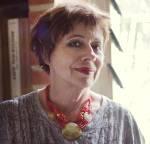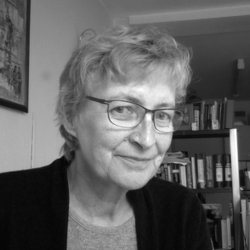The topic: a foreign language. True, nowadays it’s mine, or almost. But ten years ago the act of writing in Spanish was something that caused me waves of amazement. I was still trying to capture that amazement in my fictional diary: a short circuit between delight and surprise:
In the murmur of the sea, in a glass of warm milk, and particularly in some old photos I’m unable to throw out, I sometimes feel a fleeting touch of the language I left behind. The language in which I’m writing now and, at the same time, another that ceased to exist, in the way a landscape of rolling hills and woods ceases to exist as a train moves through it. A language that was just sounds and mystery, before a simple buenos días, before—so long before—Borges and Cortázar, neither hot nor warm, glass or milk (only perhaps sea and maybe breakfast, beach and sand), when words had no meaning, smelled of islands and summer passions. Words as tightly closed as nuts only just beginning to shed their shells into: cuánto cuesta, sangría, noche, paella de mariscos, amor. Newly hatched from the egg, clumsy, helpless: words.
(“Palabras de Antes” [Before words] in Para no perder el hilo
[So as not to lose the thread]. Caracas, Mondadori, 2009.)
In fact, my first contact with Spanish was the youthful summer I spent with a boyfriend on the island of Ibiza. Neither of us spoke the language: we had a pocket dictionary and enjoyed learning a few words. I was studying the first year of architecture in Lausanne and so my daily interactions were carried out in French, except when I went home during the vacation to Tel Aviv, where I spoke Hebrew. The Polish of my childhood was relegated to the pages of the diary I still kept in mulish loyalty to my mother tongue, a tongue that was becoming increasingly rusty. I was a precocious writer, a child who was enchanted by words and the magic that could be done with them. But before my tenth birthday my family emigrated to Israel and the Polish chapter was left behind, together with my literary dreams. For that student in Ibiza, the idea that she might one day publish short stories and novels in Spanish would have seemed as fantastic as travelling into space.
In life and journeys, however, it’s not easy to predict what will happen next. I had no idea that in a few years I would add Portugal to my list of countries when I married Fernando Da Costa Gomes (although he, as an exile from the fascist regime, was unable to return to his homeland); I’d been unaware of the labor restrictions placed on foreign graduates in Switzerland and neither could I have foreseen that a Venezuelan friend would invite us to his country. Fernando went first; I followed five months later with a baby in my arms, one hundred dollars in my billfold, and a youthful faith in the world that I no longer understand. The Lisbon-Caracas flight, with a long stopover in Curaçao, lasted over twelve hours, and I almost fainted from exhaustion while waiting for the baggage to appear in Maiquetía airport. I recount that arrival in “Suponte” (“Supposing”): another excerpt from my fictional diary reads:
Suddenly everyone gathers around to help you, black eyes, brown faces, strong hands helping you to your feet. They stroke the baby’s head, find you a luggage cart (two, three luggage carts), smile and ask you questions, but you can only return their smiles because you don’t understand a word: you’ve landed in another language.
Writing in a foreign language. Yes. But which language was my own? I’d passed my childhood in Polish, my adolescence in Hebrew, my early adulthood in French and now my adult life takes place in Spanish; and beside those, English, which is always necessary. It’s not so difficult to learn new languages. At the turn of the millennium, after twenty-five years in Venezuela, my Spanish was more than sufficient for chatting, working, bringing up children, and getting by in daily life. But for writing?
The language that enables you to write is another step on the ladder, to that rung where my childhood Polish had once stood. Knowing several languages is no help, in fact it tends toward dispersal. You have to know one, know it in your guts, in your teeth, with the confidence of someone who has grown up in it, someone who is never asked how she learned it.
I didn’t expect to reach that rung: I didn’t even feel any need to. I used to read very little: like any professional woman with children, I had more than enough to do. Our architectural firm, Kreska Proyectos Industriales, C.A., specialized in steel, aluminum, glass, and textile membranes, particularly for large-scale tensile structures where industrial design of the components is required between the engineering calculations and manufacture by metallurgic companies. We worked on specialized programs, for which we initially felt a great deal of enthusiasm. My husband—a genius in this field—has managed to maintain that enthusiasm, but mine dwindled as keeping up with technological advances took up increasingly greater portions of our time, creativity, and resources. I felt tired and empty. And I guess age didn’t help: I’d passed fifty.
It’s said that everything happens in its proper time. My proper time arrived when I attended my son’s graduation ceremony at the Universidad Católica Andrés Bello. I crossed the pedestrian bridge lined with bougainvillea in bloom, gazed on the multicolored scene of the Antímano and Mamera neighborhoods, separated from the campus by a ponderous concrete honeycomb, and felt the irresistible desire to return there, if only for a few hours, one afternoon a week. That wasn’t enough to study a major, but UCAB also offered creative writing workshops. One was dedicated to reality, that is to say nonfiction. I wasn’t interested in that; I was suffering an overdose of reality.
When they heard me say that, I was sent to see Eduardo Liendo.
And that was a piece of luck. My first fiction workshop was led by one of the greats of Venezuelan literature, not that I knew that then: literature hadn’t been part of my life for many years. I found him in a seminar room, surrounded by a gaggle of students around the same age as my younger son.
“And you’re here for…, señora?” he asked, speaking for them all.
At the next meeting, I handed in my first text. Eduardo Liendo read it, clearly interested, and pronounced:
“Your Spanish is awful, but you, my girl, are a writer.”
That was the first draft of my story “Benjamín y la caminadora” (Benjamin and the walking machine), which that year received a special mention in the prestigious literary prize run by the newspaper El Nacional, and in 2012 was included in the anthology El cuento venezolano [The Venezuelan short story], edited by José Balza. That text was, in fact, full of mistakes. Notwithstanding, from then on the “señora” disappeared, along with any difference of age and culture, from the group of six or seven students who regularly attended that marvelous workshop: I didn’t miss a single session in the whole year. That day I bought my first novel in Spanish, chosen at random: Reo de nocturnidad [Night culprit] by Bryce Echenique. And it was like a bomb going off: at the age of fifty, I returned to being the voracious reader of my childhood and adolescence. I began to write: one text a week for the workshop. Many of those short stories formed part of Cuentos con Agujeros [Stories with holes], my first publication, issued by Monte Ávila Editores in 2004, after winning the prize for unpublished fiction.
After the year at UCAB, I enrolled in other workshops, got a master’s in comparative literature at the UCV (Central University of Venezuela), was awarded other literary prizes, and published more books; and it still irritates me that in interviews I’m invariably asked how I learned Spanish. It irritates me because, in that way, I’m returned to my everlasting status of foreigner and beginner. It irritates me when people want to talk about my personal life before addressing the stories I write, their themes and characters. But what can one do? The years go by and it’s always the same question, to which I normally reply that I’d been in Venezuela for twenty-five years when I began to write. The real answer is too long for interviews. So yes, it’s true: after twenty-five years of using the language as you would a knife and fork, I finally learned Spanish. By which I mean that I really learned it; I reached that rung separating everyday language from the one that allows you to write.
I learned that other Spanish by reading. I read a great deal, devoured books written in or translated into Spanish as if to catch up on lost time. Short stories, chronicles, and novels without any rhyme or reason. Bryce Echenique, Kundera, Carlos Fuentes, Clarice Lispector, Ednodio Quintero, and Borges; everything was well worth the time spent reading. Eduardo Liendo, Javier Marías, Muñoz Molina, Onetti. Antonieta Madrid, Rosa Montero, Uslar Pietri, Isabel Allende, Cortázar… I compiled a personal dictionary on Excel with the words I found in their books, including an example of their use. I’m quoting here at random: escudarse en (justify oneself), hacer acopio de (gather, pluck up [courage]), albergar dudas (harbor doubts), ceñirse a (limit oneself to), hacer amago de (threaten to)… Expressions that I didn’t know or was unsure how to use. Words organized in groups that seemed logical to me: words for sounds (aullido, berreo, graznido); words for light, shining, and trembling (fulgor, oscilación, relumbre); words for expressing oneself in words. Words of certainty and doubt, of strength and weakness. Words for making and unmaking (derruir, desahuciar, desgajar).
I still have the yellowing pages of that dictionary, but haven’t consulted them for some time because I’ve completely internalized their contents. Flipping through them is like evoking the state of heady euphoria I lived in during those early years. Something of that feeling still exists in a remote, nostalgic form, as the memory of falling in love sometimes persists in a marriage.
Because finding a language capable of making its home in my soul as only my mother tongue—that almost forgotten Polish—had ever before done can only be compared to falling in love. A love that arrived late in life, of course, a love for someone who has always been close without your ever noticing. A love that happily has been the foundation of an enduring relationship. And a love that eventually made me part of the country in which I live: Venezuela.
Translated by Christina MacSweeney



